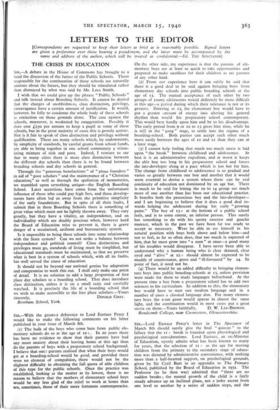Sm,—With the greatest deference to Lord Eustace Percy I would
like to make the following comments on his letter published in your issue of March 8th.
(I) The bulk of the boys who come here from public ele- mentary schools do so at the age of to+ . In 20 years there has been no evidence to show that their parents have had any more anxiety about their leaving home at this age than do the parents of boys with a preparatory school background.
I believe that one: parents realised that what their boys would get at a boarding-school would be good, and provided there were no element of compulsion, there would not be the slightest difficulty in obtaining the full quota of able children of this type for the public schools. Once the practice was established, looking at the matter at its lowest, there is no reason to believe that the mothers of elementary school boys would be any less glad of the relief to work at home than are, sometimes, those of their more fortunate contemporaries.
On the other side, my experience is that the parents of ele- mentary boys are at least as quick to take opportunities and prepared to make sacrifices for their children as are parents of any other kind.
(2) From our experience here it can safely be said that there is a good deal to be said against bringing boys from elementary day schools into public boarding schools at the age of 13. The mutual acceptance of each other by two groups of young adolescents would definitely be more difficult at this age—a period during which their tolerance is not at its greatest. Entering at 13, the elementary boy would have to put a greater :.mount of energy into altering his general rhythm than would his preparatory school contemporary. This would bear hardly upon him and be to his disadvantage. The early period from 9 or to to 13 gives him time, while he is still in the " gang " stage, to settle into the regime of a boarding-school. Both parties can accept each other much more easily between the ages of to and 12 than they can at a later stage.
(3) I cannot help feeling that much too much stress is laid upon " the break " between childhood and adolescence. At best it is an administrative expedient, and at worst it keeps the able boy too long in his preparatory school and forces the late-developer along at a pace which is too hot for him. The change from childhood to adolescence is so gradual and varies so greatly between one boy and another that it would seem essential to devise a system where there can be real continuity of education not dominated by an age bar. There is much to be said for letting the to to 14 group see much more of one another than has been our educational practice. It benefits both the precocious boy and the late-developer- and I am beginning to believe that it does a good deal to- wards helping the adolescent during his early " growing pains." The boy of 13+ at the bottom of a public school feels, and is to some extent, an inferior person. This surely has something to do with his spotty exterior and gauche manner, which in the past we have been far too ready to accept as necessary. Were he able to see himself in his natural position with boys both above and below him—and not to feel, as he so often does, that too much is expected of him, that he must grow into " a man " at once—a good many of his troubles would disappear. I have never been able to understand why a human being who is clear skinned, clear eyed and " alive " at 12 + should almost be expected to be muddy of countenance, gross and " ill-favoured " by 14. In point of fact, it need not be.
(4) There would be an added difficulty in bringing elemen- tary boys into public boarding-schools at 13, unless provision were made for them to study languages beforehand. At the present time a boy from a preparatory school has to add two sciences to his curriculum. In addition to this, the elementary boy would have to start one modem language and in a number of cases a classical language also. For many elemen- tary boys the team game would appear in almost the same light, and the combination would in most cases put a great






















































 Previous page
Previous page